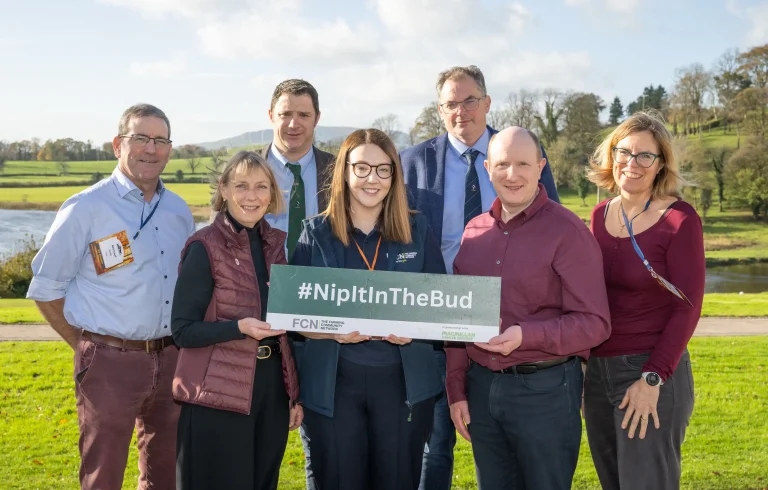18 Nov 2025
Officials are concerned farmers are reluctant to contact their doctor, while living in a rural community can also create unique challenges for accessing services and support.

Caitriona Crawford with AVSPNI and NIVA representatives at AVSPNI Autumn Conference 2025.
Vets will be encouraged to speak to their farming clients about their health as part of a new project aiming to raise cancer awareness in rural areas.
The Association of Veterinary Surgeons Practising in Northern Ireland (AVSPNI) and The North of Ireland Veterinary Association (NIVA) have joined the “Nip it in the Bud” campaign, a collaboration between Macmillan Cancer Support and The Farming Community Network (FCN).
Part of the Rural Communities Cancer Project, it encourages farmers and others living in rural communities to seek earlier diagnosis of cancer and other health conditions to facilitate better outcomes and improve chances of survival.
As part of the collaboration, which was announced at AVSPNI Autumn Conference, vets will receive CPD on human health and communication skills to conduct healthcare conversations with farmers.
They will also hand out leaflets raising awareness of the importance of early diagnosis and urging farmers to contact doctors.
Research from Newcastle University suggests that people living in rural communities often present with more advanced cancer when they are diagnosed compared with their urban counterparts, and they are also said to be 5% less likely to survive.
More than a third (approximately 36%) of Northern Ireland’s population lives in a rural population, according to the Department of Agriculture, Environment and Rural Affairs.
It is said clinicians are increasingly concerned that farmers put off contacting their doctor until late development of cancer.
NIVA president Kirsten Dunbar said: “We understand that farmers do not always prioritise their health and overlook or miss the signs and symptoms of cancer, therefore it is imperative that vets use every opportunity to raise awareness of cancer symptoms amongst the farming community and encourage them to go to the doctor as soon as possible if necessary, which could save lives.”
AVSPNI president Melanie Spahn-Holmes told the BBC vets are often considered “part of the family” by farmers and get asked health-related questions due to their medical knowledge, adding: “Whenever you’re on farms that conversation is very easy. I always have to say, ‘Go back to the doctors,’ because I’m not a doctor, and ‘Yes, I look at calves and cows, but it’s not the same as humans.’”
A recent report by Healthwatch North Yorkshire found many farmers feel more comfortable discussing health concerns with vets than doctors due to their strong relationship.
Caitriona Crawford, national manager of FCN Northern Ireland, said vets “carry considerable credibility amongst farmers”.
She added: “The support provided by both veterinary associations will undoubtedly help us encourage farming families to be more aware and ultimately save lives from a curable and treatable disease if diagnosed and treated at the early stages.”